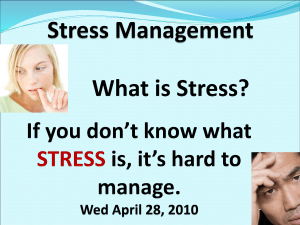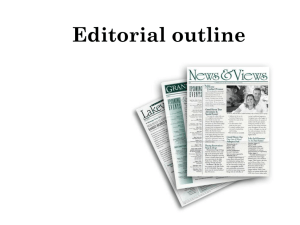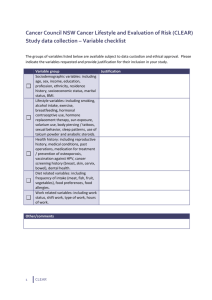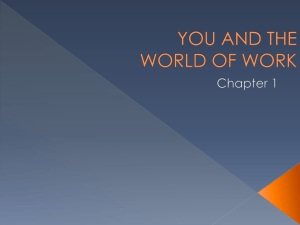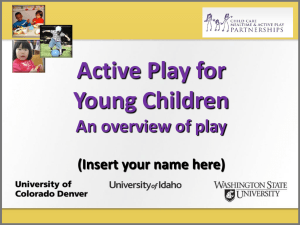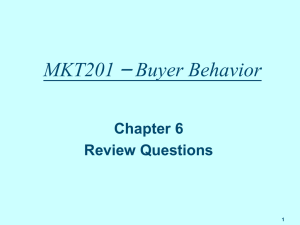Career+research+project
advertisement
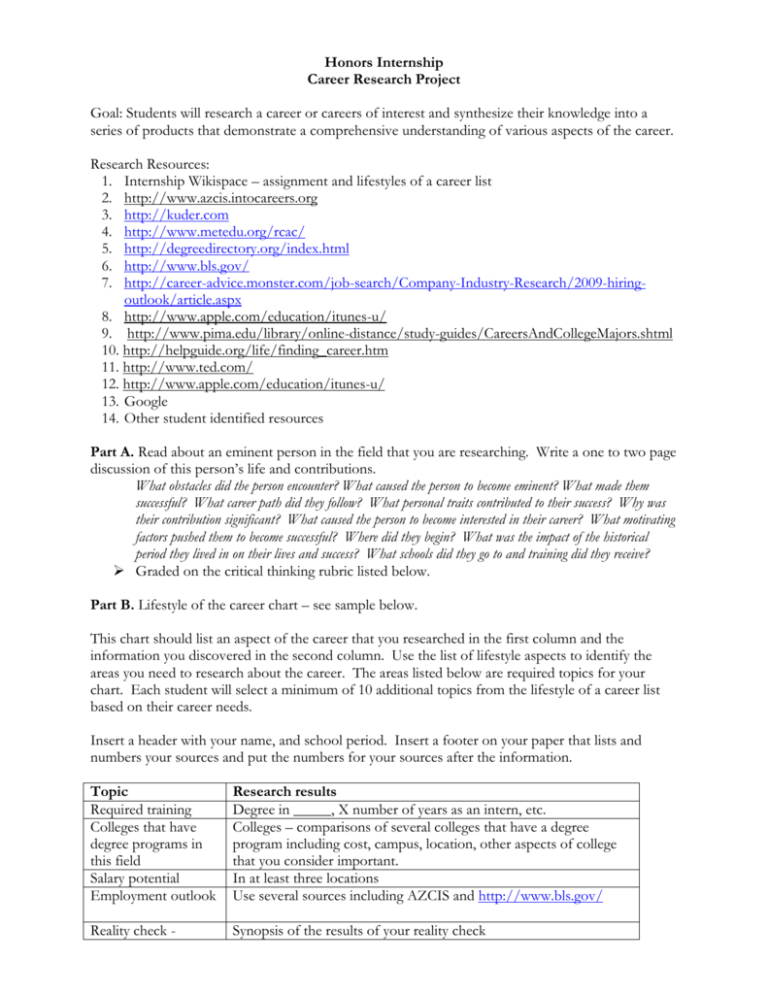
Honors Internship Career Research Project Goal: Students will research a career or careers of interest and synthesize their knowledge into a series of products that demonstrate a comprehensive understanding of various aspects of the career. Research Resources: 1. Internship Wikispace – assignment and lifestyles of a career list 2. http://www.azcis.intocareers.org 3. http://kuder.com 4. http://www.metedu.org/rcac/ 5. http://degreedirectory.org/index.html 6. http://www.bls.gov/ 7. http://career-advice.monster.com/job-search/Company-Industry-Research/2009-hiringoutlook/article.aspx 8. http://www.apple.com/education/itunes-u/ 9. http://www.pima.edu/library/online-distance/study-guides/CareersAndCollegeMajors.shtml 10. http://helpguide.org/life/finding_career.htm 11. http://www.ted.com/ 12. http://www.apple.com/education/itunes-u/ 13. Google 14. Other student identified resources Part A. Read about an eminent person in the field that you are researching. Write a one to two page discussion of this person’s life and contributions. What obstacles did the person encounter? What caused the person to become eminent? What made them successful? What career path did they follow? What personal traits contributed to their success? Why was their contribution significant? What caused the person to become interested in their career? What motivating factors pushed them to become successful? Where did they begin? What was the impact of the historical period they lived in on their lives and success? What schools did they go to and training did they receive? Graded on the critical thinking rubric listed below. Part B. Lifestyle of the career chart – see sample below. This chart should list an aspect of the career that you researched in the first column and the information you discovered in the second column. Use the list of lifestyle aspects to identify the areas you need to research about the career. The areas listed below are required topics for your chart. Each student will select a minimum of 10 additional topics from the lifestyle of a career list based on their career needs. Insert a header with your name, and school period. Insert a footer on your paper that lists and numbers your sources and put the numbers for your sources after the information. Topic Required training Colleges that have degree programs in this field Salary potential Employment outlook Research results Degree in _____, X number of years as an intern, etc. Colleges – comparisons of several colleges that have a degree program including cost, campus, location, other aspects of college that you consider important. In at least three locations Use several sources including AZCIS and http://www.bls.gov/ Reality check - Synopsis of the results of your reality check AZCIS Lifestyle topic Lifestyle topic Lifestyle topic Lifestyle topic Lifestyle topic Lifestyle topic Lifestyle topic Lifestyle topic Lifestyle topic Lifestyle topic Lifestyle topic Lifestyle Elements of Careers Attire and personal appearance o Diet o Health standards Location o Where you can live in the world o Place that you work o Global – cultural considerations Schedule o Family considerations o Travel requirements o Vacation and leisure time Level of stress o Danger o Degree of competition o Emotional demands and pressure o Privacy o Expectations and demands o Health risks o Level of criticism Skills o Interpersonal skills needed o Level of education and training o Level of intelligence o Pre-requisites o Technology o Team work Conditions o Characteristics of co-workers o Political views o Level of structure o Office environment o Legal requirements o Physical requirements o Security clearance required? o Customers o Boss o Large or small business o Variety Work-load o Extended work beyond the work day Job security/stability o Predictability Thinking and degree of challenge o Degree of creativity o Level of freedom o Level of thinking required Ethical standards o Ethical dilemmas o Religious affiliation requirements? Rewards o o o o o o o Personal values and goals Impact on society Social status Community respect Salary, benefits and retirement Fame privacy Advancement opportunities Part C. Write a 1 – 2 page conclusion What have you discovered that is important to your decision making about your future? Graded on the critical thinking rubric listed below: Critical Thinking Rubric - Expanded Level 6 Paper or product is written at a level that challenges and advances the knowledge or thinking of the instructor. – Publishable. Level 5 Paper or product shows depth (understanding complexities of the issue or topic) or breadth (seeing things from multiple points of view or connecting to parallel issue or topic). Paper has lots of supporting detail. The conclusion is global and generalizable. Ideas flow logically and show insight. Level 4 Paper or product is logically ordered and supported. Paper may show insight but there is not enough discussed to be considered an in-depth work. Paper lacks strong conclusion. Level 3 Paper or product is clear, accurate, and precise. Lots of points are discussed but the flow of ideas is not logical. Paper lacks strong conclusion Level 2 Paper or product demonstrates a general understanding or is a summary of the topic. This paper is really a list of words discussed in class made into sentences with little or no elaboration. Writing skills prevent ideas from being clear and logical. Limited conclusion. Level 1 Paper or product is a factual reiteration of information relevant to the topic. This paper is very short with not much detail. This paper is really a list of some words discussed in class made into sentences with little or no elaboration. Writing skills prevent ideas from being clear and logical. Lacks conclusion. Level 0 Paper or product contradicts what is known to be true about the topic without supporting evidence or is irrelevant. This paper is very short with not much detail. It is confusing and has many inaccurate/illogical statements. Lacks conclusion. This rubric is an expanded more descriptive version of the original critical thinking rubric. Conclusions: Each essay must have a conclusion – not a summary and restatement of the thesis. Conclusions need to synthesize data into logically supportable assumptions. Conclusions should also demonstrate the ability to make connections and generalizations. The goal of the conclusion is to create a bigger more global (macro) concept based upon the synthesis of concepts presented in the body

